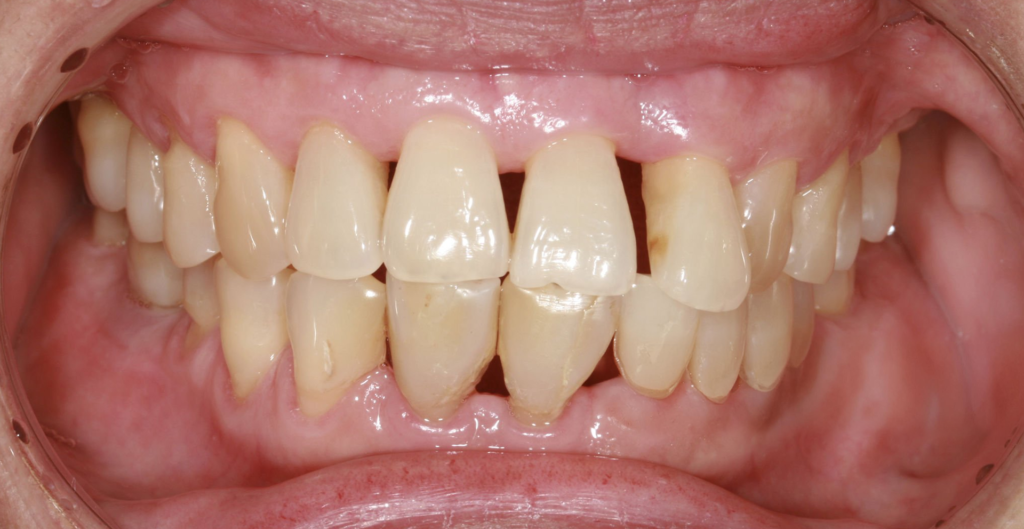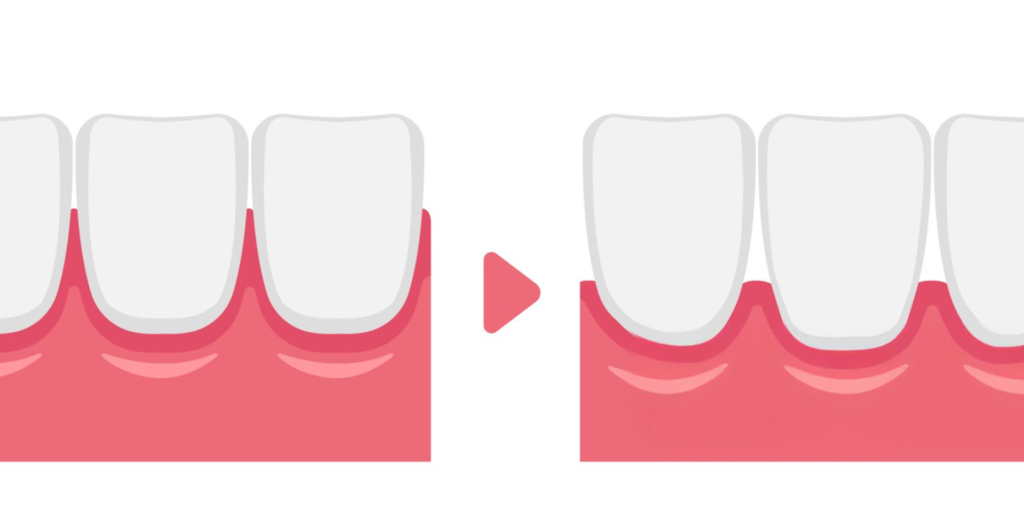Gum Recession
Gum recession refers to the situation where teeth recede from their root surfaces. This situation can often be caused by various reasons such as the progression of gum diseases, dental plaque and tartar accumulation, incorrect tooth brushing technique or genetic factors. Receding gums can both negatively affect the aesthetic appearance and have serious effects on the health of the teeth.
As the gums recede, the tooth roots are exposed, which can lead to increased sensitivity in the teeth. In addition, exposed tooth roots can increase the risk of decay and, in later cases, even cause tooth loss. Receding gums can also increase the risk of oral infection.
Gum Recession Symptoms
Symptoms of gum recession usually develop slowly and are usually at an advanced point when they begin to be noticed. Symptoms may include:
- Exposure of tooth roots: As the gums recede, tooth roots become more visible. This may cause the teeth to appear long and create aesthetically disturbing gaps.
- Sensitivity in teeth: Momentary sensitivity may be felt in the teeth, especially when hot, cold or sweet foods are consumed. With gum recession, tooth roots are exposed and the dentin layer under the tooth enamel becomes sensitive.
- Redness or swelling in the gums: As the risk of gum recession and infection increases, redness or slight swelling in the gums may be observed. This may indicate an advanced stage of gum disease.
- Bleeding in the gums: Bleeding in the gums when you brush your teeth or floss is one of the symptoms of gum recession. Healthy gums do not normally bleed.
- Teeth appear longer or have gaps between them: As the gums recede, the teeth may become longer and gaps may form between them. This can disrupt the natural alignment and aesthetic appearance of the teeth.
It is important for people who experience these symptoms to consult a dentist. With early diagnosis and appropriate treatment, the progression of gum recession can be stopped and dental health can be preserved. Additionally, regular dentist check-ups and good dental care habits play a big role in preventing such problems.
Gum Recession Treatment

Treatment options for gum recession may vary depending on the severity of the condition and the patient’s general health condition.
- Gum Surgery: When gum recession reaches a serious point, gum surgery may be required. In this process, the gums are reshaped and the bare areas of the tooth roots can be protected by covering them.
- Gum Graft: In advanced cases, especially if the gum recession is severe and the root surfaces are exposed, gum graft can be applied. In this procedure, the gums are re-covered and protected, usually by using tissue or synthetic materials taken from another area in the mouth.
- Intradental Restorations: In cases where tooth roots are exposed, the dentist may recommend crowns or similar restorations. With these methods, both an aesthetic and protective function can be provided by covering the bare surfaces of tooth roots.
- Antibiotic Treatment: Antibiotics can be used in the treatment of gum diseases, especially in cases of infection. Antibiotics can help control gingivitis and speed up the healing process.
- Professional Teeth Cleaning and Oral Care Training: Regular dental cleaning is important to prevent and control gum recession. Additionally, teaching oral care techniques such as correct tooth brushing and flossing can also be effective in protecting gum health.
Treatment options are generally determined based on the patient’s individual situation and the dentist’s assessment. Early diagnosis and treatment can stop the progression of gum recession and is important for long-term dental health. It is critical for patients to visit their dentist regularly and comply with the recommended treatment plan to maintain gum health.
How to Prevent Gum Recession
The following precautions can be taken to prevent gum recession:
- Regular dentist check-ups and cleanings
- Gaining the habit of correct tooth brushing and flossing
- Developing healthy eating habits
- Avoiding smoking and alcohol consumption
Gum recession is a condition that can usually be prevented and treated. Gum health can be protected and improved with early intervention and regular dental care. If you are experiencing receding gums or other gum problems, it is important to consult a dentist. Your dentist can help you have a healthy mouth and teeth structure by recommending appropriate treatment options for you.

To summarize; Gingival recession can be a serious problem in terms of oral health, but it can be controlled with early diagnosis and appropriate treatment. The important thing for those experiencing this condition is to recognize the symptoms and consult a dentist. Your dentist recommends appropriate treatment options according to the severity of your condition and offers you the best solution. You can protect your gum health with measures such as regular dentist check-ups, good oral hygiene habits and a healthy diet.
Remember, healthy gums are important not only for a beautiful smile, but also for your overall health. Taking early precautions is the most effective way to prevent future problems. To learn more about receding gums or address your concerns, consult a dentist. Take action today for healthy smiles and protect your gum health!
Dentist Kürşad Aktaşgil

